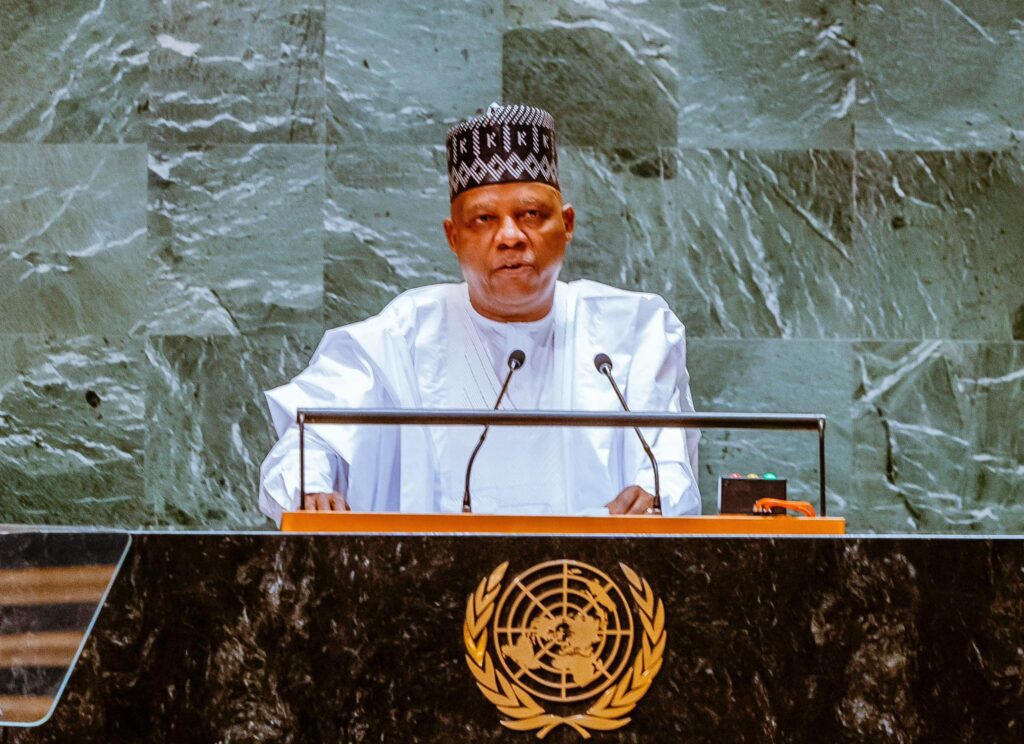Nigeria’s presentation at the 79th United Nations General Assembly was not merely a diplomatic formality; it was a compelling call to re-evaluate the frameworks that govern global governance.
Vice President Kashim Shettima, speaking on behalf of President Bola Tinubu, addressed critical issues that extend beyond Nigeria’s borders, including climate change, debt relief, and the stark inequalities inherent in global power dynamics, especially within the United Nations.
The essence of Nigeria’s message is both urgent and rational: the crises we face today—be they economic, environmental, or security-related—require solutions that are as interconnected as the challenges themselves.
The current structure of the UN is inadequate for tackling these complex issues.
Nigeria’s advocacy for a more inclusive Security Council, one that accurately reflects the realities of the 21st century, is not just timely; it is essential.
In a world where Africa, with its 1.4 billion people and rapidly growing economies, lacks permanent representation on the UN Security Council, the call for reform is not only justified but imperative.
As President Tinubu highlighted, the UN Security Council is an anachronism, a remnant of a post-World War II framework that no longer resonates with today’s realities.
His assertion that Africa deserves a permanent seat transcends mere representation; it calls for the integration of diverse perspectives that could fundamentally alter global strategies on critical issues such as terrorism, migration, and climate change.
One of the most powerful elements of Nigeria’s message is its urgent plea for debt relief for developing nations. Tinubu’s stance is unambiguous: when countries are shackled by overwhelming debt, their capacity to invest in vital areas like healthcare, education, and infrastructure diminishes dramatically. This not only threatens national stability but also poses risks to regional and global security.
The West’s hesitance to confront this pressing issue—despite the escalating crises in many Global South nations—only deepens the crisis. In this context, debt relief is not an act of charity; it is a strategic necessity for fostering global stability.
Nigeria’s commitment to addressing climate change highlights a critical issue that profoundly impacts the Global South. President Tinubu’s remarks about the devastating floods in cities like Maiduguri emphasise that, for many nations, climate change is an urgent threat rather than a distant concern.
His appeal for the global community to fulfil its COP commitments serves as a stark reminder that survival for some countries hinges on meaningful action. The inaction of wealthier nations is not merely negligent; it poses a serious risk.
On the terrorism front, Nigeria is positioning itself as a leader by organising the upcoming High-Level African Counter-Terrorism Meeting.
This initiative emphasises the understanding that terrorism is a global challenge necessitating cooperative solutions.
Notably, Nigeria is shifting the focus from traditional security measures to addressing the root causes of conflict, such as poverty, hunger, and inequality, which often fuel extremism.
Nigeria’s perspective is particularly powerful because it recognizes that systemic inequality and exclusion are often at the heart of extremism. This approach aligns with a broader movement for greater representation of the Global South on the world stage.
With the expansion of BRICS and the African Union’s recent inclusion in the G20, there is a growing acknowledgment that the voices of emerging economies must be heard and engaged with.
Nigeria’s proposals at the UN reflect this shift, and it is imperative for Western powers to recognise the importance of these voices rather than dismiss them. Engaging with the perspectives of countries like Nigeria is essential for creating effective, inclusive global solutions.
To be sure, Nigeria faces its own internal challenges such as corruption, insecurity, and governance issues. But rather than undermine the country’s credibility, these challenges lend weight to its call for global cooperation. Nigeria knows the complexity of development in the 21st century firsthand, and its voice carries the authority of experience.
Nigeria certainly grapples with significant internal challenges, including corruption, insecurity, and governance issues. However, rather than detracting from its credibility, these obstacles enhance Nigeria’s call for global cooperation. The country understands the complexities of 21st-century development firsthand, and its voice is grounded in valuable experience.
The pressing question is whether the international community, particularly Western powers, will heed this call. Will they reform the UN to amplify African voices in the Security Council? Will they recognise the necessity of debt relief not as charity but as an investment in global stability? And will they finally take meaningful action on climate change, acknowledging that the survival of nations—and perhaps the planet—depends on it?
The global order is at a pivotal moment. We can either cling to outdated structures and policies or embrace a more inclusive and equitable system that benefits everyone. Nigeria’s presentation at the UN General Assembly outlines a path forward that demands courage and a commitment to listening. This vision is crucial, as the alternative—a fractured world paralysed by division in the face of shared threats—is untenable.

